His sun-kissed songs and breezy Beach Boy bandmates formed the joyful soundtrack of a generation—a California dream that continues to resonate today.
But behind Brian Wilson’s musical genius lay a life shaped by trauma, mental illness, and deep personal turmoil—pain that began in childhood and surfaced even as his fame grew.
Wilson endured a violent upbringing at the hands of his father, experimented heavily with drugs, and became the victim of a manipulative therapist. His brother Dennis fell into the orbit of cult leader Charles Manson. Yet despite it all, Wilson kept making music—until a dementia diagnosis finally silenced his creativity.
On Wednesday, Wilson’s heartbroken family announced his death at the age of 82.
‘It was hard to feel happy and light when there were sad things in my head,’ Wilson wrote in his 2016 autobiography I Am Brian Wilson. ‘It was hard to feel free when I was tied down.
‘But the only choice was to try.’
And try he did – through childhood abuse, personal tragedies and battles with rampant drug use – with such success that Wilson helped create one of the most successful musical groups of all time.
He battled through lawsuits, fractured relationships with family and bandmates, and a public struggle with mental illness. But he never stopped.
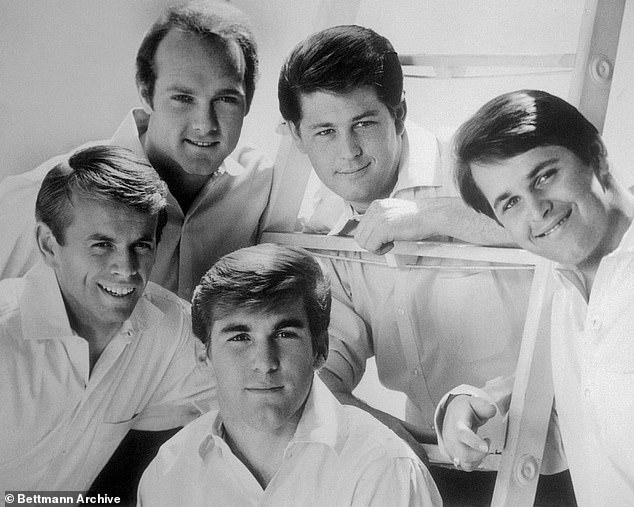
Behind Brian Wilson’s (third clockwise from left in 1966) rise to superstardom was a tortured childhood and turmoil sparked by abuse and mental illness
‘Whenever I’ve been told to stop – by someone who thought they had power over me, by something that happened around me, by the voices in my own head – I kept going,’ he wrote.
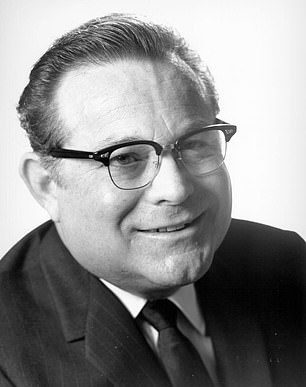
Wilson endured a violent upbringing at the hands of his father Murray (above), experimented heavily with drugs, and became the victim of a manipulative therapist
Wilson was still working on music in his final years, even as his health declined and he was diagnosed with dementia.
Following the death of his wife Melinda last year, he was placed under conservatorship at their home in Beverly Hills.
And Wilson, himself, had spent his entire adult life sharing his music – and his pain, often openly and publicly – with the world.
‘Music has always been the light in dark times,’ he wrote in the final chapter of his book.
The oldest of three brothers, Wilson was born in 1942 in California to Audree and Murry Wilson, an amateur songwriter who instilled his boys with a love of music but was also ‘cruel’ and ‘violent.’
‘My dad was violent. He was cruel,’ Wilson wrote in his 2016 memoir.
‘He drank too much and became a monster – and he didn’t know how to deal with his son’s fears. Whenever I got afraid, he would yell at me or slap me or call me a p****’
Describing himself and brothers Dennis and Carl as ‘kids who get hit,’ Wilson wrote how he’d ‘think of the things [their father] said always with exclamation points.
‘Even if he wasn’t yelling, his tone was like that.’
Murry Wilson was thrilled but demanding when Wilson exhibited a particular musical aptitude and started a band with his brothers, cousin Mike Love and friend Al Jardine.
But Murry ‘wanted us to work all the time, and nothing we did was ever really good enough.
‘He would set up our amps and scream at us to do more.’
Murry Wilson started out managing the Beach Boys, though they fired him in 1964 as their star rose – and as problems began to plague Brian.
He wrote in his autobiography how live performances and TV slots scared him.
‘Many of my worst memories are from being nervous up there, and many others are from the things I did to keep myself from being nervous up there,’ he wrote. ‘Some of the drinking was because of that. Some of the drugs were because of that.
‘Some of the voices in my head I heard just before I went onstage, and they didn’t have anything good to say about me.’
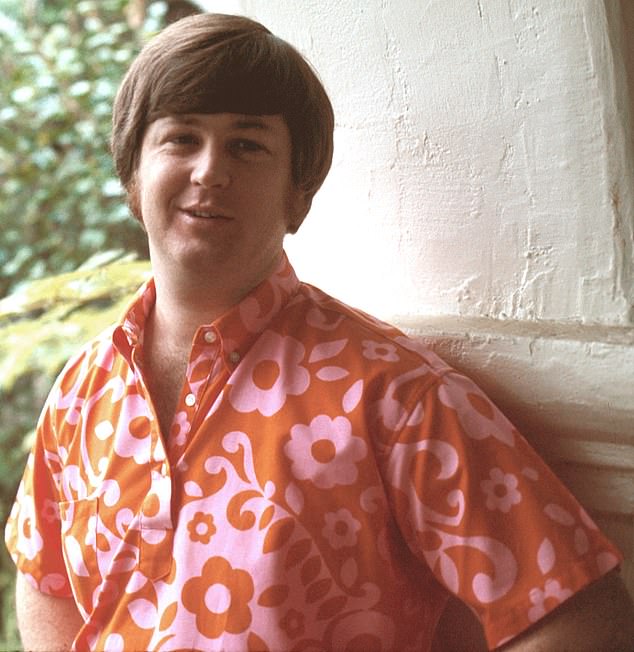
Beach Boys founder Brian Wilson was hailed by his fellow stars as tributes poured in following the legendary musician’s death aged 82; pictured 1968
In 1964, aged 22 and newly married to a 16-year-old, Wilson had a breakdown on a flight to Houston.
‘My thoughts swarmed and I blacked out,’ he wrote. ‘To me I blacked out. To everyone else it looked like I was screaming and holding my head in the aisle.’
Wilson took a temporary break from touring. But he’d also started using drugs the same year, everything from marijuana to acid to cocaine.
‘They were ways of dealing with the fact that my head wasn’t right,’ he wrote. ‘But they didn’t solve a thing. With the drugs, in fact, came very other kind of problem.’
He was writing more and staying home while falling more and more into drug use. And external problems would come to plague him, too.
At the end of the Sixties, Wilson’s brother, Dennis, began associating with Charles Manson after getting to know two of his female followers.
He raved about Manson in interviews and let members of the ‘family’ stay in his house; Dennis even co-wrote with the infamous killer and recorded one of his songs.
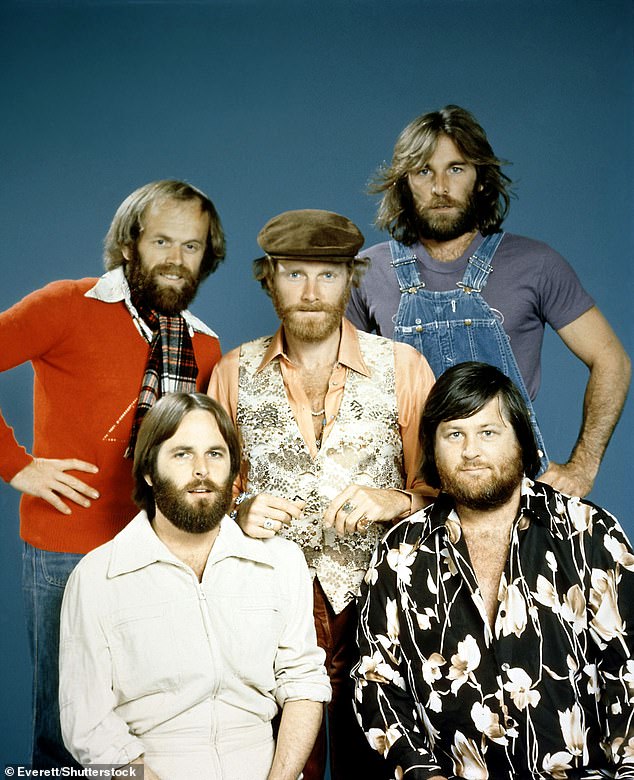
The Beach Boys; Dennis Wilson (standing), and (counter clockwise), Brian Wilson, Carl Wilson, Al Jardine and Mike Love, pictured in 1976
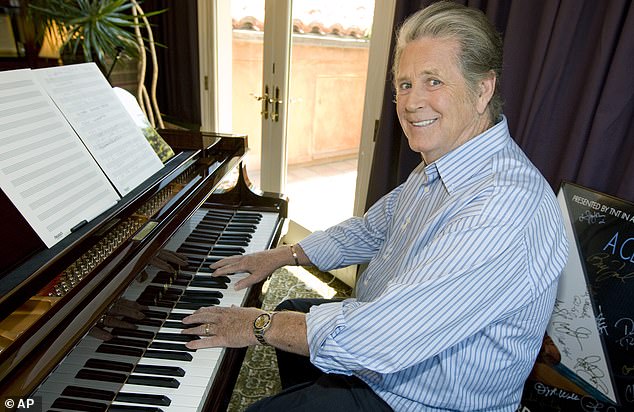
Wilson battled through lawsuits, fractured relationships with family and bandmates, and a public struggle with mental illness. But he never stopped making music
He’d later try to distance himself from the Manson clan, who went on to murder victims including actress Sharon Tate; Dennis declined to testify against the killer but was privately interviewed by authorities before it was deemed his testimony was not needed.
But the relationship between Brian and Dennis, also plagued by heavy substance use, would get increasingly fraught.
In one instance, Dennis allegedly got Brian to buy $15,000 worth of cocaine; the older brother’s former bodyguard and another later beat up Dennis, leading to a restraining order against them, writes Steven Gaines in his 1986 book Heroes and Villains: The True Story of the Beach Boys.
Dennis died tragically homeless in 1983, drowning after a day of drinking.
By then, Brian had been divorced five years from Marilyn, who’d given birth to the couple’s two daughters, Carnie and Wendy, in the late 1960s. The marriage was unable to weather Wilson’s erratic behavior and substance abuse.
He’d also fallen under the control of controversial therapist Dr Eugene Landy, whom he’d first begun seeing in 1975, after the musician had ballooned in weight to 300 pounds.
‘He got some results, but he went too far,’ Wilson wrote. ‘He was getting too involved, and then I found out what he was charging. I confronted him about it. I was pretty angry … I threw a punch and he threw one back and that was the end of it – that time, at least.’
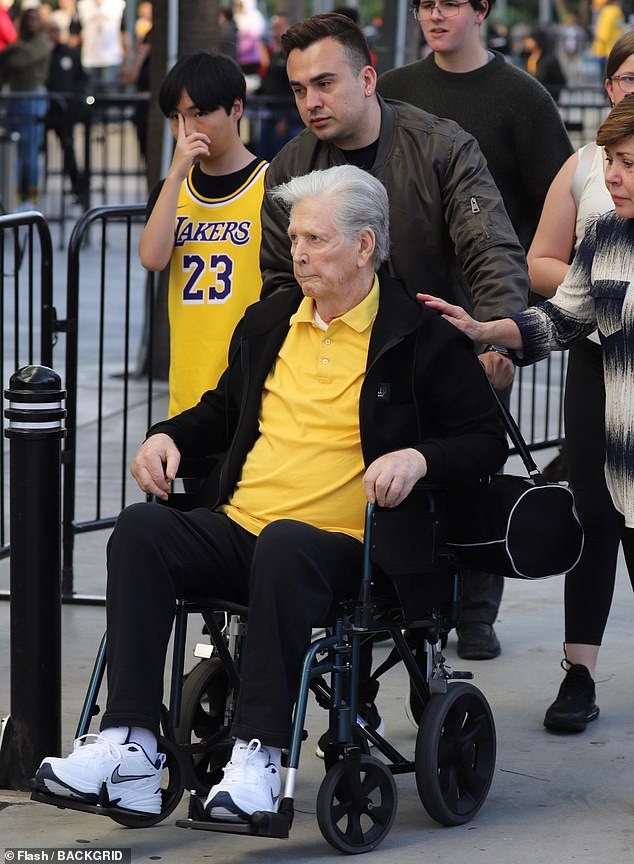
The last time Wilson was seen in public was last April, when he emerged looking frail in a wheelchair to attend a Los Angeles Lakers game
After a few years, however, Landy was called back in to again address Wilson’s mental and physical health – and, as time went on, Landy began exerting more and more influence in his patient’s life.
That including Wilson’s career, with Landy forming business partnerships with the singer and even getting producing credits – all while charging what would be millions in today’s money, at times up to $35,000 a month.
‘Dr Landy was a tyrant who controlled one person, and that person was me,’ Wilson wrote in his book. ‘He controlled where I went and what I did and who I saw and what I ate. He controlled me by spying on me.
‘He controlled it by having other people spy on me. He controlled it by screaming at me. He controlled it by stuffing me full of drugs that confused me.’
Landy eventually lost his license in 1989 and by the early 1990s had almost entirely left Wilson’s life.
The Beach Boy remarried in 1995, later adopting five children with his wife Melinda. They remained married until her death last year.
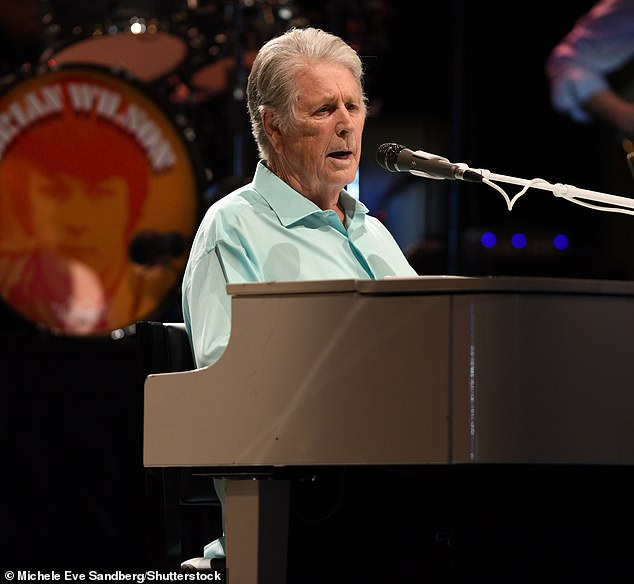
Wilson was still working on music in his final years, even as his health declined and he was diagnosed with dementia
Around the time of his second marriage, Wilson was also beset by lawsuits – including actions filed by his cousin and fellow Beach Boy Mike Love, who sued Wilson over claims in his 1991 memoir as well as over songwriting credits and royalties.
Wilson lost both his brother Carl, who’d been a lifelong smoker, and mother Audree over a two-month period between 1997 and 1998.
As the years wore on, he’d rejoin the Beach Boys for events and other shows, though even the 50th reunion tour in 2012 was marked by a public rift among members.
Wilson was philosophical in his memoir four years later, recalling a talk show host in the 1970s who’d asked him ‘about how I kept going through all of it: through the drugs, through the lawsuits, through the bad feelings that came up between me and the people closest to me.
‘I had an answer ready,’ he wrote: ‘My name is Wilson … Maybe that’s where I got the will.’












